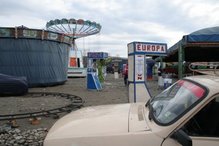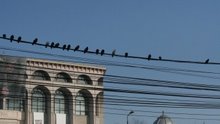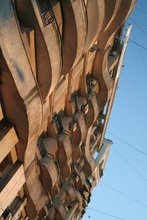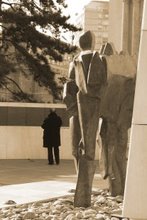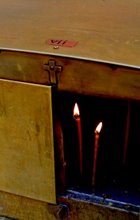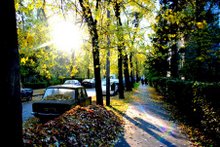I have been trying to think about this question of what my favourite business/technological innovation is... and, for the life of me, I cannot seem to think of anything plausible.
What is yours? Why?
Yours hectically, nutshell
Showing posts with label nutshell-journey. Show all posts
Showing posts with label nutshell-journey. Show all posts
Saturday, 1 December 2007
Tuesday, 13 November 2007
3 a.m. (like the matchbox 20 song)

As a consequence of sleeping pretty much all day to get my fever down and keep my head from exploding, I am wide awake now. I am headacheless through seventeen-hour-sleepy-spontaneous-remission-therapy. Monica and me spent time drinking tea and nibbling biscuits until well after midnight. We talked research, writing, people. I am actually so highly awake that my thoughts are racing. Everything is potentiality. I think in the dark and I imagine the entire neighbourhood population of socialist blocks around me fast asleep. I like the calm of the dead of the night. It is the time for second chances, a time with so much space it makes you feel little. I feel my stomach tingling. I turn on the light. I write, again.
I really feel fieldwork ending. Lots to do before the end of the year. I will cross the gates to the Orient, as they say here, then return home. Life takes me back to Scotland, and I will start writing the actual thesis. I may have reconciled myself with that thought. I have lots of material, I have lots of ideas, it is ‘merely’ a matter of putting them into a coherent, rigorous, beautiful fashion. Sayeth she, but little did she know.
And then, maybe, hopefully, slowly, I will get, like Aino said, to the more important things in life. I am not sure how it will work out, leaving here is the first step. I will get there in the end. Sayeth she, and tried to look at the stars, failing, for being in the city, in a flat, surrounded by concrete. Can we wish upon the stars if we do not see them? Course we can. Sayeth Paul Eluard:
‘La nuit n’est jamais complète.
Il y a toujours, puisque je le dis,
Puisque je l’affirme,
Au bout du chagrin
Une fenêtre ouverte,
Une fenêtre éclairée,
Il y a toujours un rêve qui veille,
Désir à combler, faim à satisfaire,
Un coeur généreux,
Une main tendue, une main ouverte,
Des yeux attentifs,
Une vie, la vie à se partager.’
Sayeth she: here’s another reason to start a new day in a few hours. Bonsoir. Bonne nuit.
Labels:
experiential,
nutshell-journey,
nutshell-meanderings
Friday, 9 November 2007
Two Parrots at the Fair
We stopped in our slow walk through the packed, muddy fairground where we had gone because it was the day of the archangels Michael and Gabriel, and people were taking it a bit easier on these kinds of days of special saints. We had bought a gogoasa each, a wonderfully simple sweet baked in oil, and were eating them, having a look at the vegetable stand nearby, and planning what else we needed to buy from there. Suddenly I noticed a guy walking around with a little wooden tray that had a little high-seat for two green little parrots. On the bottom of the tray was a kind of file system, holding tiny folded papers. As I looked at him, and turned to ask my friends about what he was all about, he was already coming our way. He said, hello, are you married? It immediately dawned on me that it was about the future somehow. Of immense naivety, I was still curious about the function of the parrots. I saw they were real and I noticed they also had a little corner on the tray where some bird food was spread out for them. He said, come on only two lei, I will tell you the future, what zodiac are you? My friends were already interjecting, we do not wish to be tricked, we do not give money for nothing. Noticing us having our gogosi, he said, looking at me, because I was obviously more fascinated, ok… for you one lei, because I also want to buy myself a gogoasa. What star sign are you? Returning to the hopeless manoeuvre of wooing my friends, he said, and maybe if you all get one, I can also take a car home. He was completely open about his money making scheme, and the way in which it worked: I tell you what you want to hear and you give me some money. I was amused, and said, ok I will give you one lei. So he just gave me a piece of paper, no longer insisting on what starsign I was. I was a bit ashamed of my own gullibility, and put it in my purse until I was by myself to read it. Let me tell you it was not the biggest revelation of my life, but I just like horoscopes, even the plumpest ones. The function of the parrots: good marketing tools. If at least they had been ventriloquists and sung the horoscope to me. That would have impressed me. Where did all the ventriloquists go? Why are fairs no longer about wonder, but merely about monkey-making? What are the new sites of wonder? Are they muddy? What is your favourite site of wonder?
Saturday, 3 November 2007
Sunday, 21 October 2007
Let me go home…




“Another autumn day has come and gone away”
In case of overdose consult your cliche-doctor.
Sun with teeth. Corn and cabbage and carrots.
Wood clippings. Blades. Clouds.
Cold clothes dry slowly now.
I ate a walnut and thought of you.
It must be the time.
The age of wanting a home of one’s own.
Momentarily I feel heavy of decisions to be made.
Trece timpul. Zboara mintea. Trece timpul.
My mantra for the slow hours.
Constancy. Change. Constancy. Choice.
Take your pick. Autumn sale is on.
Hurry, hurry, for you might miss the deal.
Calm down your life is in your hands.
Is it? Alternative scenarios told daily.
Let us presume that
Tout est pour le mieux dans le meilleur des mondes possible.
Imi linisteste sufletul idea aceasta pana dimineata.
Adorm mai bine cu tine in gind.
I prepare the awkward homecoming dance.
M-intorc singura.
P.S. For fellow postgrads, compulsory reading here.
Labels:
nutshell-journey,
nutshell-meanderings,
research
Tuesday, 16 October 2007
Chassez-vous des tigres?

Come to think of it, a lot remains unexplained in Saint-Exupéry’s Petit Prince. Maybe the allegorical quality of the work makes it so timeless. This Canadian author has written a beautiful reply to the (hopefully autobiographical!) narrator’s exhortation to tell him if you hear from the prince. In the original, the title is Le Petit Prince retrouvé. Jean-Pierre Davidts characterises the traveller from the planet with the arrogant-loving rose, three volcanoes, and baobab seeds, and his pointed questions and requests ‘dessine-moi un mouton’, so well that you are really happy and warm at heart to hear from the little guy. He does talk quite a bit more than in the original. Davidts continues the story by creating a homage of kindness, in his own voice, but without forgetting how much he owes to the original. He meets, among others, an ecologist and a statistician. You will be happy to know, I am sure, that the sheep is doing well, too. Not all shall be revealed here. The work is not as much serious literature (being so dependent on intertextuality?), but it is a fitting description of our times’ madness.
Saturday, 29 September 2007
Going West again. Fiat lux!


This week’s general impression was that I could not finish anything. I meandered, I wandered, I strayed, and I was not able to do anything with a lot of directed vision. This after-the-fact evaluation did not lessen my enjoyment.
Voyage voyaaaage, plus loiiiin que la nuit et le jour… voyage. Did you recognise the song? Villa-City was hard to leave because of the festival and general influx of Friday afternoon traffic of stressed Bucuresteni looking for peace. The taxi driver played elaborate word games with colleagues on the radio involving ‘pastrama de caini’ which I found hilarious. Leaving prematurely is not made easier by leaving in the evening, with the train, all clichés about train-sentimentality are, hehe, true. I love seeing settlements from the back, from the train perspective.
We passed so many construction sites I was reminded of the man doing tourist information in Villa-City who painted such a concise picture of the way in which present-day capitalism creates patchy development, because it is oriented towards growth too much. 500000 tourists per year in Sinaia, and a lot more in the valley at large, and with a land price ten times higher than in the village I work in. He was bright-eyed and fervently telling us about how some people managed to overcome every regulation to build their villa. His stories were underscored by accompanying, generous arm gestures and mimics adding to the rhetorical effect. I asked, somewhat fake-naively, how come? He made a grimace telling something like, come on girl, open your eyes, and said, you cannot imagine what kind of money some people have. How come? They just do, and they do what they want. Every person, he said, can be bought. He told us about the environmental pressures on the valley as blocks of flats were being built, about the pressure on the natural park to recede in favour of development, and I am still kind of curious about his own life story.
Stopover to see the almost-full moon over Kronstadt-la-belle, then I travelled back towards the village, via Bran and Rucar. I kept thinking of the therapeutic soothing value of looking at landscapes travelling past the bus window, and of chatting to fellow travellers about the apple harvest, nephews, and industry. I paid attention to how the fences change when you cross from Brasov into Arges this time, following Finnish Kati’s advice. The diamond-shapes slowly give way to elaborate ornamental, mostly round and flowery wrought iron motifs. The walnut trees were radiant with the greatest colour, golden-yellow, against the blue sky. The beeches were dipped in browner shades. All that is most beautiful before it dies. I was asking myself what makes the brightness of what is actually autumnal decay. When a pot plant dies, it is not really nice, just sad. Maybe it is the mass of the leaves and the puffiness of the forests seen from further away. But then again, the beauty does not disappear when you consider a single yellow leaf. I ask you scientists how it is that this process creates such bright colours (crimson, red, orange, light-bright-brown, yellow)? I came to the (hasty, probably) conclusion that it might be about the light, and thought of the implication of thinking the world not in terms of discrete things, but appreciating it in its wholeness, and this implies, in most cases, an issue of light. And the cool seasons of spring and autumn do display a special quality of light. But the issue is light itself. Ingold has said this a lot better than I could:
[t]he objects of vision, we suppose, are not sources or manifestations of light but the things that light illuminates for us. The objects of hearing, on the other hand, are not things but sounds or sources of sound. (Ingold 2000: 244)
This kind of ecological thinking
forbids us to conceive of vision as an operation of thought that would set up before the mind a picture or a representation of the world, a world of immanence and of ideality. Immersed in the visible by his body, itself visible, the see-er does not appropriate what he sees; he merely approaches it by looking, he opens himself to the world. And on its side, this world of which he is a part is not in itself, or matter. (Merleau-Ponty 1964: 162)
This is the porous subject that I am so intrigued by, still. It is what happens if you talk to someone, and you are really immersed in what they are saying. You intermingle not just with minds, but with personality (ok,ok,… used naively!) and individual being-in-the-world. Intersecting lifeworlds? I am such a Durkheimian in some ways, but I happen to think ‘intersubjectivity’ is not a good term to speak about what happens. ‘Inter’ does not describe the relationship. We need a more practical term.
References
Ingold, Tim (2000) The Perception of the Environment. London: Routledge.
Merleau-Ponty, Maurice (1964) The Primacy of Perception and other Essays on Phenomenological Psychology, the Philosophy of Art, History and Politics. J. M. Edie (ed) Evanston: Northwestern University Press.
Friday, 31 August 2007
home

Here my mother caught a moment of laughter on camera. Given that she usually does not deal with the photographic family documentation, unfortunately Mumu’s head was half out of the frame. Siblings can have very different laughs. Whose laugh do you like/dislike? What do you think about your own laugh? Do you laugh loudly often? How many times have you laughed out loud today, for instance?
Home. I miss it, and I keep thinking about what home is, what it means and represents.
Thursday, 23 August 2007
bells and flowers

Today I got lost in other people’s stories, on waking my head was light from having fought mosquitoes during the early hours of morning. I walked around the tarmac-ground softened from the heat and wobbly like sand, and thought of everyone far away I love. One man greeted me and I was amazed. Have a good day, Sir, you mistake me for somebody else. I crossed the iron footbridge over the Basarab railway station and looked down through the gaps that remained, stubbornly, square, in the smoothly worn brown-red iron trodden by many feet over a long period of time, each soft step taking with them a molecule or two. What I was looking at was mizerie, smelly garbage. I was half expecting to discover the body of a decaying dog. I did not. An old woman was complaining about the dust, and it settled on my body like a silky surface, mixed with the transpiration (that word choice should make my status of ‘ladyship’ quite obvious), and later on could be rubbed off like flaky skin. I could not stand the sight of one child standing at a crossroad and breathing into a bag. The world is too loud, too indifferent. One big man sat on the same spot as yesterday, talking to a quartier neighbour, an old lady with white hair elaborately strung together in a bun, carrying many shabby plastic bags. I had an acute sense of loss on Calea Grivitei, walking past a curtained shop window that a billboard with the opening times in these kinds of stick-on plastic letters, and a basket with a stuffed white cat plus several kittens with scary stary eyes. Looking through the ruins of one once majestic corner building, I could see through the holes the twinkling sign of a hotel, newly risen into the sky. Another project of modernity, only the context, this time, being capitalism. This environment, momentarily an extension of my self, decaying just like my body, and would not remain until I return. A fragment ‘il y a longtemps que je t’aime jamais je ne t’oublierai’ rhythmed my heart. It rung in my head like the church bells in the village, with the characteristic tierce that render them so distinctive. ‘… each hung bell's [Bow swung finds tongue to fling out broad its name’ (G.M.H.). It made me understand separation, time, and nostalgia. A moment of lucidity in a fog, rhyming, producing consonance, while working towards that project-of-little-importance. In the meantime has become the work I do, because that’s what I get up for in the morning. My dreams, however, were flying off with the ceiling, I found myself looking at the stars. I dreamed I am going to explode, and I held my arms in readiness. I was certain of the cause: a flower was growing in my stomach, and I sat down near the piano and waited. I think I was smiling.
Tuesday, 14 August 2007
Plums, prunes and tuica
Now for a lovely example about words expanding or compressing their meaning when introduced into a foreign language. Linguistically, the origins of the word ‘prune’ are to be found in the Middle English period, from Old French, via Latin from Greek prou(m)non. In Latin ‘pruna’ denotes the genus of the actual plum tree, but today, in English, prune merely denotes the plum ‘preserved by drying, having a black, wrinkled appearance’. Further, it has the secondary, metaphorical meaning of an ‘unpleasant or disagreeable person’. Plum, on the other hand, signifies the fruit, the tree, the colour, and, informally, as an adjective, ‘a highly desirable attainment, accomplishment, or acquisition, typically a job’. This word is recorded in the dictionary as coming from Old English plume (with a line on the u), from medieval Latin, pruna. So this word existed earlier in the English language. In Romanian, which is the Romance language that has kept the most Latin forms, the word is, unsurprisingly, pruna, plural prune. How about for a historically unverifiable (? I put my faith in you historians out there) question: since when have people made brandy and jams and what not? What was on a medieval food table – of the wealthy, let us say, to leave more scope? All answers, albeit speculative, welcome.
People here are picking plums at the moment. They go for days and days, because it is a year with a lot of plums. There are more than 100,000 plum trees in this valley, mostly planted during communism, and not a penny has been invested in the orchards since the revolution at least... Part of the neighbouring comuna’s territory was a state farm of fruit trees, mainly functioning by unpaid labour, recruiting students into so-called Praktika, and the army into agricultural labour. People were considered chiaburi if they owned a still, because they could apply the custom of asking for a tax amounting to a tenth of the production of people who would use the still in the village. The plums are delicious, and will be mostly end as the traditional brandy, tuica (pronounce: tzuica, because of the , below the t that I cannot reproduce on the internet). For this end, they are kept in wooden casks for a while until they have fermented. Then, through a distillation process, the alcohol is separated from the fruit, and the wash remains for fodder purposes. The first bit that seeps out of the still is very strong and I recommend waiting… (one coughing, cursing anthropologist-wimp will result otherwise, in my own experience). I am very curious whether and how the new EU regulations will be applied in this regard, and whether a new return to secret brandy making will happen, just like in communist times (for the Aberdonians: Illicit Stills will multiply in the village…). In the spring, when there was some distilling going on in the other valley, people were arguing that, in fact, the legislation of last year needed to be applied to these plums (and apples) because the harvest was from 2006. I feel this discourse is on the brink of changing (it don’t take no clairvoyant to predict this… ;-P). Noroc!
People here are picking plums at the moment. They go for days and days, because it is a year with a lot of plums. There are more than 100,000 plum trees in this valley, mostly planted during communism, and not a penny has been invested in the orchards since the revolution at least... Part of the neighbouring comuna’s territory was a state farm of fruit trees, mainly functioning by unpaid labour, recruiting students into so-called Praktika, and the army into agricultural labour. People were considered chiaburi if they owned a still, because they could apply the custom of asking for a tax amounting to a tenth of the production of people who would use the still in the village. The plums are delicious, and will be mostly end as the traditional brandy, tuica (pronounce: tzuica, because of the , below the t that I cannot reproduce on the internet). For this end, they are kept in wooden casks for a while until they have fermented. Then, through a distillation process, the alcohol is separated from the fruit, and the wash remains for fodder purposes. The first bit that seeps out of the still is very strong and I recommend waiting… (one coughing, cursing anthropologist-wimp will result otherwise, in my own experience). I am very curious whether and how the new EU regulations will be applied in this regard, and whether a new return to secret brandy making will happen, just like in communist times (for the Aberdonians: Illicit Stills will multiply in the village…). In the spring, when there was some distilling going on in the other valley, people were arguing that, in fact, the legislation of last year needed to be applied to these plums (and apples) because the harvest was from 2006. I feel this discourse is on the brink of changing (it don’t take no clairvoyant to predict this… ;-P). Noroc!
Saturday, 11 August 2007
Singularity
As I sit and wait for the thunderstorm to pass over my head and the village, in the absence of electricity, in the smell of the rain and the sounds of cars wheezing through puddles and the tapping on the corrugated iron roof, the most complete singularity wraps itself around me. It makes my stomach turn and my head spin. I long for detachment from this world, but I would not have it if it was thrust upon me. Being is full of contradictions that seek conclusion, choices that fuel the burning of old wounds and long-lost memories, and moments needed for waiting, healing, interiorising. The thunderstorm resembles a point d’orgue in music. A lot can happen during that time, when the rhythm fleetingly becomes suspended, and a solo breaks into the space, with moments of silence weighing down on the audience like love on a heart-in-waiting.
Wednesday, 20 June 2007
Taking Care
I met this beautiful eighty-year-old woman. It had been her birthday the day before. She lives in a two-bedroom house with a terrace, and some painted outside walls. She has a well and a garden that she still works in. The strawberries were twinkling between the green leaves, and the orange fire flowers had grown almost a metre high. She told me how her husband had died thirty years ago, and how life now was not good anymore, because she could not do anything anymore. Take no decisions and not enough action. She was showing me all her crafted blankets, of wool, and cotton, and the costumes she had sewn. She told me her daughter was unhappy about her wearing torn jumpers, because she did not understand what she was keeping the good clothes for. She did not want to dress up because she did not leave the house. Her loom showed a piece of cloth in the making that was white, with the occasional stripe pattern. She was working on the finely-grained cotton towels that are used on the occasion of orthodox burials. She was not angry at her life, or bitter, but when it would be time for her to leave, she would be ready.
Thursday, 7 June 2007
Unfolding
"It is the direction that decides whether we are being released from the centre in a movement that is ever freer or whether we are becoming more and more attached to a centre that will ultimately destroy us: the question means nothing less than life and death".This is what Paul Klee had to say about the spiral. We are developing in ways that cannot be reduced to the point of origin. Time is a creative force in itself and sweeps through us, and we love and leave and werkeln and build and pray and hope and sing and feel our way through the dark patches of the sun.
What, they asked again, for the umptieth time, does it take for love to remain? You are drawn to each other, strangers, and yet you can recognise their humanity in an instant. You may have grown up differently, with different values, religions, interests, tastes, preferences, priorities. You can tell kindness. You can feel truthfulness, groundedness, lightness in the palms of their hands. The petals can poison you just as they can make you whole. You discover patches of each other, you talk, you disagree and get upset, you find the common ground back, you laugh, you are touched, moved, rocked, spiralling into attraction of a different kind. You take risks with willingness and eagerness and impatience. You wait for the other because they have filled your soul with crystals of honey. You learn how to make compromises, and to understand what the other one is saying, not just what you thought you wanted to hear. You learn to live with what you thought you could never accept. Things take time. That’s love.
I have been able to let go a bit of my tightly structured actions and started to enjoy living here. It is easier with the summer. The trouble is that this way of being makes me wonder how much of pulling-together and disciplining-to-the-extremes it takes to get the phd done, and how much I am allowed to live. It is thoroughly enjoyable though to swing with the rhythms that surround me rather than being in full dissonance following those rhythms not grounded in the present landscape. So I will dance a bit more. Let us see how long I can get away with it. kitty-gritty
What, they asked again, for the umptieth time, does it take for love to remain? You are drawn to each other, strangers, and yet you can recognise their humanity in an instant. You may have grown up differently, with different values, religions, interests, tastes, preferences, priorities. You can tell kindness. You can feel truthfulness, groundedness, lightness in the palms of their hands. The petals can poison you just as they can make you whole. You discover patches of each other, you talk, you disagree and get upset, you find the common ground back, you laugh, you are touched, moved, rocked, spiralling into attraction of a different kind. You take risks with willingness and eagerness and impatience. You wait for the other because they have filled your soul with crystals of honey. You learn how to make compromises, and to understand what the other one is saying, not just what you thought you wanted to hear. You learn to live with what you thought you could never accept. Things take time. That’s love.
I have been able to let go a bit of my tightly structured actions and started to enjoy living here. It is easier with the summer. The trouble is that this way of being makes me wonder how much of pulling-together and disciplining-to-the-extremes it takes to get the phd done, and how much I am allowed to live. It is thoroughly enjoyable though to swing with the rhythms that surround me rather than being in full dissonance following those rhythms not grounded in the present landscape. So I will dance a bit more. Let us see how long I can get away with it. kitty-gritty
Angels

I know that really they’re people. They appear and offer their help. They show me kindness. They make my cynical self blush and hide in a corner. They are genuinely interested. They say hello to me on the street. They tell me about their own encounters with strangers. They take me with them to the mountains to relax. They restore my suflet. They give me strength. They make me speak about what I feel and ease my homesickness. They make me laugh and dance. They make everything worthwhile.
Monday, 30 April 2007
happiness is a mat that sits on your doorway







you'll have recognised the line by the counting crows.
aberdeen was full of movement. a lifetime crammed into a week resembling a poem by william carlos williams (no it is not pathethic to write that!). only after opening the fridge in bucharest and seeing the very same milk tetra packs that remained from when i left did i realise that i have only been gone a brief while. friends found back, scottish and salsa dancing, indian food, discussions, a flying spaghetti monster with mobile eyes, walks and seagulls. beats with my brother, coffee with mum. it was a magical time, with people materialising when i thought of them, and with sensitivity heightened to the extent that i could feel people better again. after some time i didn't need to explain about the last six months anymore. we had arrived in the same world again. flying north when flowers are starting to fade also means you get to see more blossoming. i found back the pleasure of reading and learnt about the enclave of gorazde, and the wind-up bird chronicle (still recommenging murakami for anyone who needs a journey of dreams and stories resembling a silk garment). real sadness came over me when the plane came down over english patterned fields, windsor castle and a lake with little dinghies. leaving to less comfortable places in the hope of learning. i miss you already.
Thursday, 26 April 2007
Ukommen a Schottland
Di Saach mat de Fliijeren ass jo sou, dass dat alles ze seier geet. Et kennt een dann och un ouni Probleem, an ech war sou frou fir zreck dass ech schon Deeg firdrun nit mi schlofe konnt, an ech war matt mengem ganzen Etre ‘poised’ wi dat joi su schein heescht op Englesch fir rem heihinner. Ech war benzich, well hei ass di Plaatz di mech an de leschte puer Joer vill geformt huet, an wou ech frou war. Fir d’eischt war ech einfach nemmen iwwerrascht an iwwerwaelticht vun all den Autoen hei, vun de Stroossen, dem groen Himmel, dem Granit. Nee wi propper ass et. Nee wat hun di all ee komeschen Accent wann se Englesch schwetzen. An si sin sou frendlich. Mee ech war gefaang an enger Art Nervositeit gekoppelt matt extremer Middichkeet, an ech war liicht desorienteiert vun dem Gejaitzs vun de Meiwen moies frei. 6 Auer moies, ech sin hellwaakrich, an ech konnt neischt iessen vun lauter Elektrisiteit. Firwat get et hell matzen an der Nuecht? Firwat reent et vun alle Seiten? Firwat hun ech emmer di falsch Kleeder un? Ei, d’Sonn hei pickt mech nit. Ech war dann och opgereecht fir jiddfereen hei ze gesin an normal Saachen ze maan, wi an de Kino ze goen an vleicht bei den Inder. Ech hun dat remfonnt wat ech vermesst hun, an d’Freijoer hei ass genial. D’Faarwen an d’Klorheet vun der Atmosphere am Norden hu mech wierklich bereiert.
No e puer Deeg Gefill wi Insomnia matt pickichen Aan an Nerven aus Chinapabeier sin ech dann elo ganz ukomm… an muss an 60 Stonnen rem meng Valisse paken.
No e puer Deeg Gefill wi Insomnia matt pickichen Aan an Nerven aus Chinapabeier sin ech dann elo ganz ukomm… an muss an 60 Stonnen rem meng Valisse paken.
Thursday, 8 February 2007
oglinzi pe zapada








When have you last taken a train that made your ears pop because of the altitude difference? When have you last been on a train that ran along crooked rails and made a melodic sound that would have kept you awake all night if it had been a night train? I crossed the Carpathians yesterday with CFR. Cluj Bucharest in eight hours of beauty (and rattling). Here then some snowy impressions leaning more to the side of perpetuation of the legend of beautiful, timeless Transilvania. A lot of my pictures turned out badly because of the dirtiness of the train windows… After all this snowy, windy minus-degree Transilvania, Bucharest today invited T-Shirts and ice-cream for those fond of them: 18 degrees of sunniness. I decided I do not mind getting that cold that has been announcing itself if I can sit in the park, even just for a moment, without my jacket, scarf and hat. I feel like getting a more or less permanent home again, after that week on the road. Ridiculous? You try fieldwork. You look. We talk again.
Subscribe to:
Posts (Atom)









